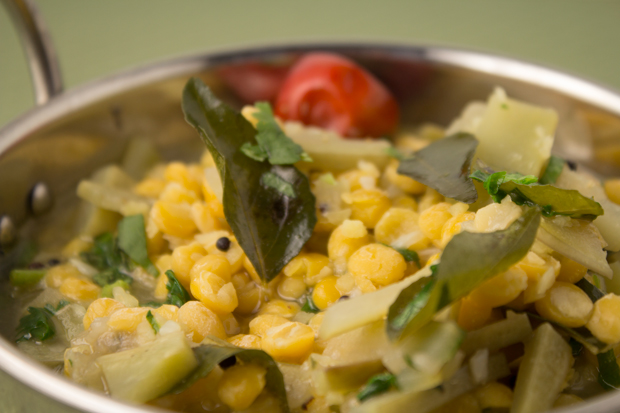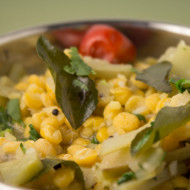Gujarati-style chana dal with bottle gourd and curry leaves

They say that Eskimos have hundreds of words for snow. Much the same can be said about Gujaratis and legumes. Growing up I can’t remember a meal or occasion–from weeknight dinner to wedding banquet–where there wasn’t a pulse in one form or another on the table. And more often than not it was the star of the show as it still is in any Gujarati home. To be fair, pulses–or dals as they’re generically known in India–are revered everywhere in that country. But in my (biased) opinion Gujaratis cook them in more–and tastier–ways than any other group and today’s recipe is a perfect example of both a Gujarati-style dal and Indian comfort food. (The only reason dals haven’t featured more prominently on this blog is because they make for terrible food porn, and food styling is not my forte as you’ve probably noticed.)
This dish is as simple as it gets but it requires a couple of ingredients you may not have on hand. The first is asafoetida (known as “hing” in India), a central spice in Gujarati cooking that is the dried and powdered secretion of the root of an herb. When raw it has what can only be politely described as an unpleasant smell, with a taste to match. But cooking transforms it into an umami bomb and imparts a characteristic and wonderful aroma. The other ingredient is a type of gourd known variously as bottle gourd, calabash, dudhi and lauki. It looks somewhat like an elongated squash but with a pale green skin. While technically a fruit, bottle gourd is generally treated as a vegetable in Indian cookery and used to make everything from steamed dumplings (muthia) to dessert (dudhi halwa). (Those more familiar with Japanese food may find it interesting to learn, as I certainly did when researching for this post, that kanpyō (干瓢), used in traditional Japanese cuisine, is in fact the dried shavings of this gourd!) You can find both asafoetida and bottle gourd in Indian grocery stores. (In the UK Tesco sometimes carries them as well.)

Gujarati-style chana dal with bottle gourd and curry leaves
Yield: 2 servings
Prep Time: 10 minutes (plus 1 hour for soaking dal)
Cook Time: 20 minutes
Total Time: 30 minutes (plus 1 hour for soaking dal)
Ingredients:
- 1 cup chana dal, soaked in hot water for about 1 hour and drained
- 250 g bottle gourd, diced into thin, 1 cm-square pieces (about 2½ cups worth)
- 2" piece ginger, minced
- 2 small green chiles, minced
- ½ tsp cumin powder
- ½ tsp coriander powder
- ½ tsp asafoetida
- 1½ tsp salt
- 1½ Tbsp vegetable oil
- 1 tsp mustard seeds
- 2-3 whole dried red chiles (boriya marcha)
- 12-14 fresh curry leaves (kaddipatta)
- ½ tsp sugar
- small handful coriander (cilantro), coarsely chopped
- steamed basmati rice to serve
Directions:
- Place the dal, bottle gourd, half of the ginger, green chiles, cumin, coriander powder, asafoetida and salt in a pot along with 2 cups of water. Bring to a boil over medium heat and then lower heat to a simmer.
- In a small skillet, heat the oil over medium-high. Add the mustard seeds, red chiles and the remaining ginger and fry, shaking the pan, until the mustard seeds begin to pop. Then stir in the curry leaves and fry another 10 seconds or so until they're wilted. Pour everything into the dal. Cover and cook until the dal is done, about 15-20 minutes. Make sure not to overcook the dal (there should still be a bite to it).
- Stir in the sugar and taste for salt.
- Garnish with coriander leaves and serve hot with rice.
